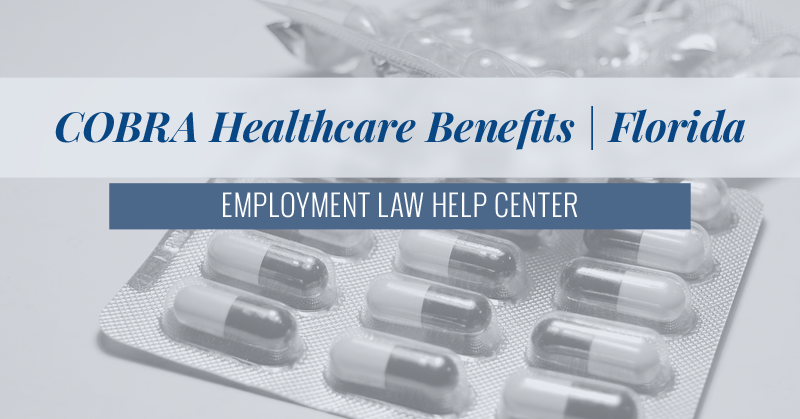





If you have experienced an employment, wage, or labor related violation, please contact us for assistance.
COBRA continuation coverage gives Florida workers and families who lose their employer-sponsored health insurance benefits the right to choose to continue their group health plan for a limited period of time, under certain circumstances, such as job loss, a reduction in hours worked, divorce, and other “qualifying events.” If you and your loved ones have lost your healthcare coverage because of one of these qualifying events, and you believe you may be eligible for continuation coverage under the federal Consolidated Omnibus Budget Reconciliation Act, or Florida’s Health Insurance Coverage Continuation Act, contact an experienced Florida employment law attorney today to discuss your legal options.

The federal Consolidated Omnibus Budget Reconciliation Act (COBRA) allows retiring employees in Florida, or those who have lost their healthcare coverage due to job loss or reduced work hours, to continue their group health benefits for a limited period of time. COBRA continuation coverage also applies to the employee’s dependents who lose their healthcare coverage because of divorce or legal separation, a loss of dependent status under the insurance plan’s provisions, death of the covered employee, or the covered employee qualifying for Medicare. Federal COBRA only applies to employers with 20 or more employees, and continuation of coverage extends from a minimum of 18 months to a maximum of 36 months, depending on the employee’s situation. In some cases, COBRA coverage may continue for an additional 11 months if an insured employee suffers a disability that occurs during a qualifying event, though coverage still cannot exceed the limit of 36 months.

The state of Florida also has a “mini-COBRA” law, called the Florida Health Insurance Coverage Continuation Act, which provides a similar continuation of healthcare coverage for employees who work for small businesses with fewer than 20 employees, and who are not covered by federal requirements. Under Florida’s mini-COBRA law, an employee must notify the insurer within 30 days of losing his employer-sponsored health plan that he is eligible for continued coverage, and the coverage can last for a maximum of 18 months.
Losing your job or having your hours at work reduced can be devastating for you and your family financially, but losing your healthcare coverage as a result of job loss or a reduction in the hours you work means your loved ones may be without health insurance until you find a new job. Fortunately, if you lost your employer-sponsored health benefits because of a qualifying event, such as voluntary or involuntary job loss, divorce, or death of the covered employee, you may be eligible for a temporary extension of benefits under federal COBRA or Florida’s mini-COBRA law. Consult a knowledgeable COBRA continuation coverage lawyer today to find out whether you and your family qualify for extended health benefits.

COBRA continuation coverage gives Florida workers and families who lose their employer-sponsored health insurance benefits the right to choose to continue their group health plan for a limited period of time, under certain circumstances, such as job loss, a reduction in hours worked, divorce, and other “qualifying events.” If you and your loved ones have lost your healthcare coverage because of one of these qualifying events, and you believe you may be eligible for continuation coverage under the federal Consolidated Omnibus Budget Reconciliation Act, or Florida’s Health Insurance Coverage Continuation Act, contact an experienced Florida employment law attorney today to discuss your legal options.
If you believe you have experienced an employment, wage, or labor related violation, feel free to contact us for assistance.


The federal Consolidated Omnibus Budget Reconciliation Act (COBRA) allows retiring employees in Florida, or those who have lost their healthcare coverage due to job loss or reduced work hours, to continue their group health benefits for a limited period of time. COBRA continuation coverage also applies to the employee’s dependents who lose their healthcare coverage because of divorce or legal separation, a loss of dependent status under the insurance plan’s provisions, death of the covered employee, or the covered employee qualifying for Medicare. Federal COBRA only applies to employers with 20 or more employees, and continuation of coverage extends from a minimum of 18 months to a maximum of 36 months, depending on the employee’s situation. In some cases, COBRA coverage may continue for an additional 11 months if an insured employee suffers a disability that occurs during a qualifying event, though coverage still cannot exceed the limit of 36 months.

The state of Florida also has a “mini-COBRA” law, called the Florida Health Insurance Coverage Continuation Act, which provides a similar continuation of healthcare coverage for employees who work for small businesses with fewer than 20 employees, and who are not covered by federal requirements. Under Florida’s mini-COBRA law, an employee must notify the insurer within 30 days of losing his employer-sponsored health plan that he is eligible for continued coverage, and the coverage can last for a maximum of 18 months.
Losing your job or having your hours at work reduced can be devastating for you and your family financially, but losing your healthcare coverage as a result of job loss or a reduction in the hours you work means your loved ones may be without health insurance until you find a new job. Fortunately, if you lost your employer-sponsored health benefits because of a qualifying event, such as voluntary or involuntary job loss, divorce, or death of the covered employee, you may be eligible for a temporary extension of benefits under federal COBRA or Florida’s mini-COBRA law. Consult a knowledgeable COBRA continuation coverage lawyer today to find out whether you and your family qualify for extended health benefits.

This is an advertisement. This website is not affiliated with any government organization or trademarked product. Results are not guaranteed. This website provides a free matching service and is not responsible for information or services from third party providers. This website is associated with an advertising group that represents lawyers, it is not a law firm. Every case is different and services available will vary depending on state.
Copyright © 2016 Employment Law Help Center. All rights reserved.